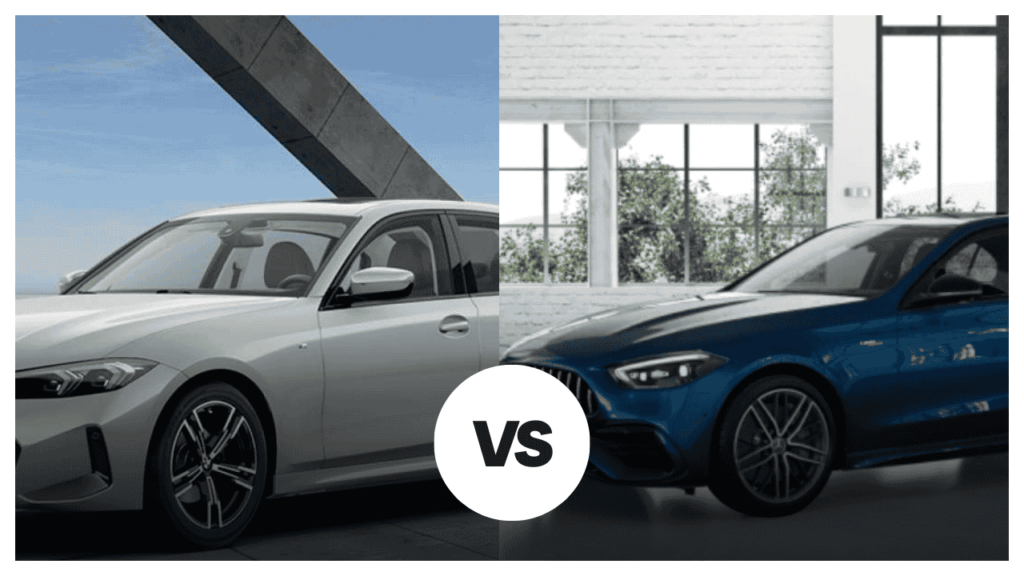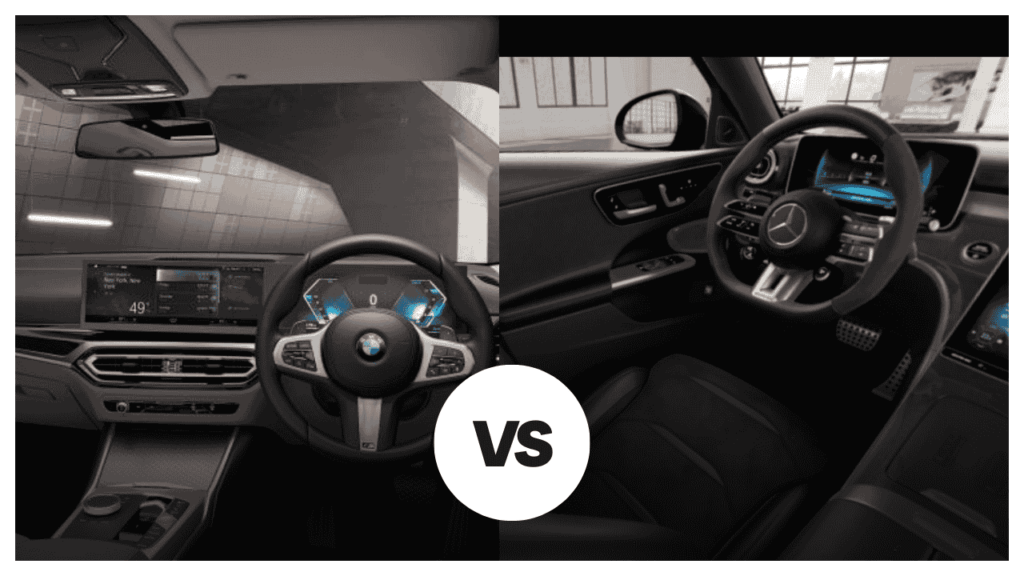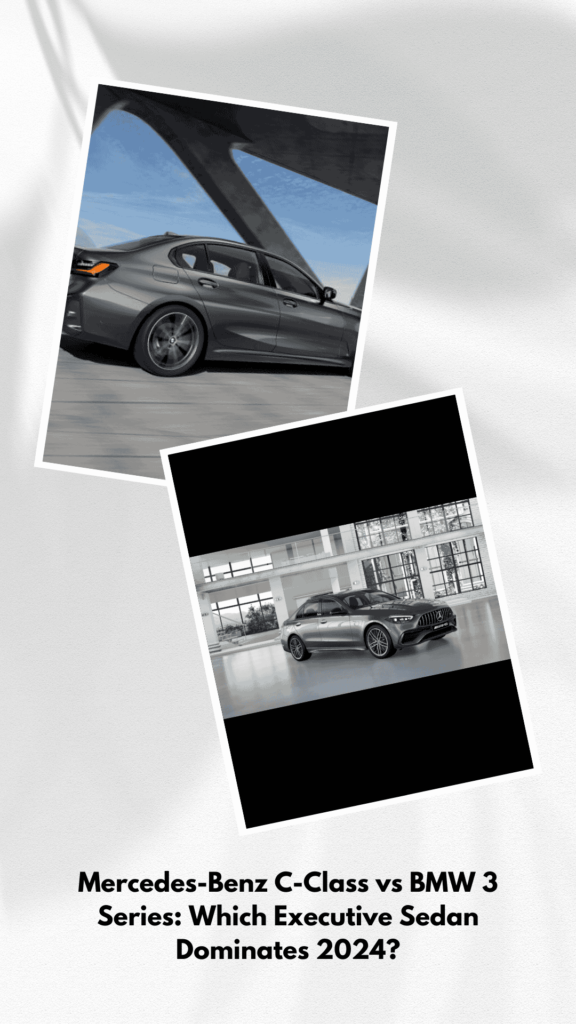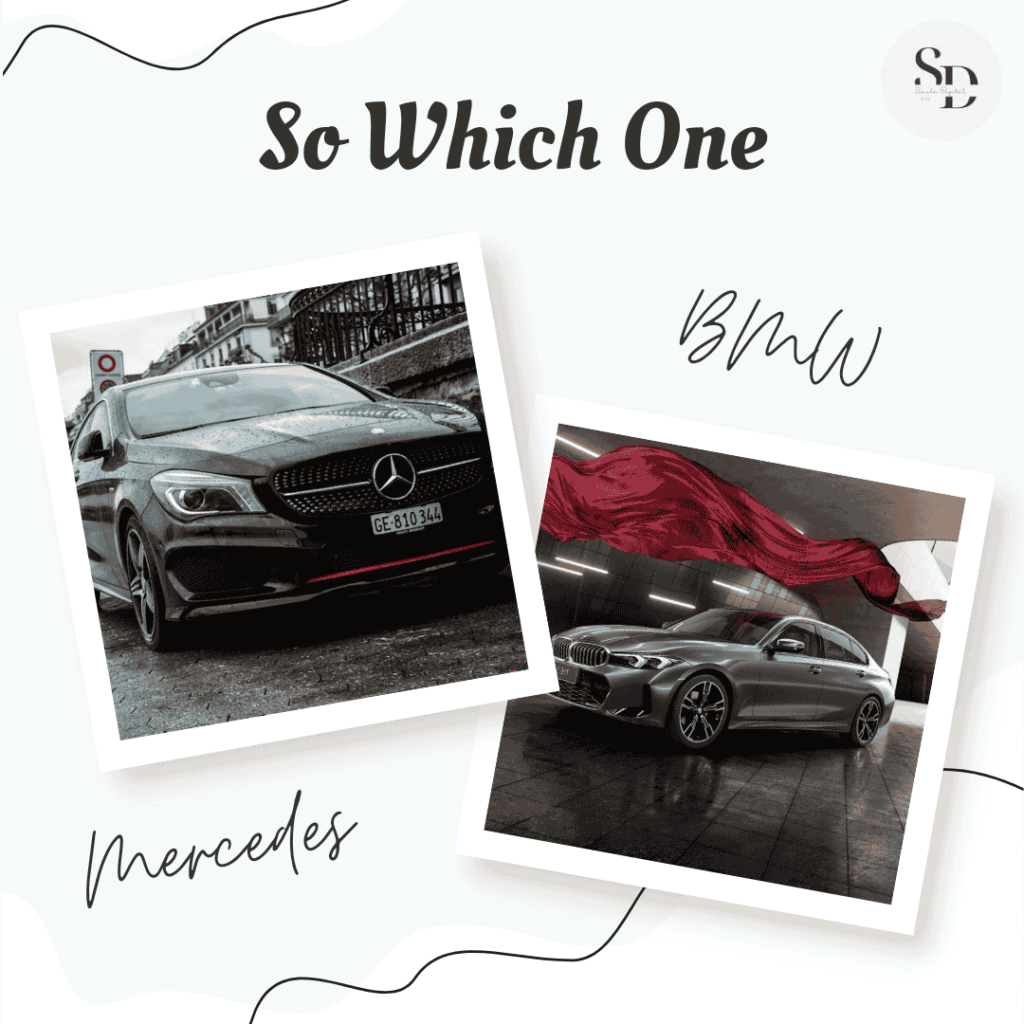Mercedes-Benz C-Class vs BMW 3 Series: Which Executive Sedan Dominates 2024? – Uncover the ultimate showdown between the 2024 Mercedes-Benz C-Class and BMW 3 Series. We compare performance, luxury, tech, and more, to help you pick the best executive sedan.
Table of Contents
Introduction and Origin
In the competitive landscape of luxury sedans, the 2024 Mercedes-Benz C-Class and BMW 3 Series are at the top of their class. These two vehicles have long been contenders for anyone seeking a blend of performance, comfort, and advanced technology in an executive sedan. Both models have been updated for 2024, offering modern engines, cutting-edge features, and luxury refinements. Whether you are drawn to the sophisticated, smooth ride of the C-Class or the agile, sporty performance of the 3 Series, this comparison will help you make an informed decision. Let’s explore key aspects such as engine performance, safety, technology, and resale value to determine which car truly stands out.

Mercedes-Benz was founded in 1926, but its roots trace back to 1886 when Karl Benz built the first petrol-powered car, the Benz Patent-Motorwagen. Gottlieb Daimler and Wilhelm Maybach were also early pioneers, creating another key piece of automotive history. The combination of these legacies led to the formation of Mercedes-Benz under Daimler-Benz AG. Mercedes quickly became known for luxury, innovation, and its pioneering role in the automotive industry.
The Mercedes-Benz C-Class debuted in 1993, intended to be an entry-level luxury sedan. Over the decades, it has evolved into a sophisticated and technologically advanced vehicle. The C-Class is often viewed as a compact version of the E-Class and S-Class, with shared design elements and luxury features.
BMW (Bayerische Motoren Werke), founded in 1916, originally focused on aircraft engines. Following World War I, the company transitioned into motorcycles and, later, automobiles. By the 1930s, BMW was producing cars that quickly gained a reputation for performance and engineering excellence, solidifying its place as a top-tier luxury and performance carmaker.
The BMW 3 Series made its debut in 1975, quickly becoming synonymous with driving pleasure and sporty dynamics. The 3 Series established itself as a benchmark in the compact luxury sedan market, combining performance, technology, and luxury in one package.
Comparing the Mercedes-Benz C-Class and BMW 3 Series
1. Engine Performance
Mercedes-Benz C-Class: The 2024 C-Class comes with a 2.0-liter turbocharged inline-four engine. This engine delivers strong performance, combining power with fuel efficiency. The C-Class focuses on delivering smooth acceleration and a refined driving experience, making it suitable for those who enjoy effortless cruising with a touch of power.
BMW 3 Series: The 3 Series, on the other hand, has a similar 2.0-liter turbocharged engine but focuses on delivering a sportier driving experience. Known for its agility and responsive handling, the 3 Series is often chosen by drivers who prefer more engagement on the road. Although its power output is slightly lower than the C-Class, the BMW’s performance is tuned for a more dynamic feel.
2. Transmission and Drivetrain
Mercedes-Benz C-Class: Equipped with a 9-speed automatic transmission, the C-Class ensures smooth shifts and offers better fuel economy at higher speeds due to the extra gears. The option for Mercedes’ 4MATIC all-wheel-drive system also enhances grip and stability in various driving conditions, particularly in wet or icy environments.
BMW 3 Series: The 3 Series features an 8-speed automatic transmission that is tuned for quick, responsive gear changes, supporting its reputation as a more performance-oriented vehicle. Rear-wheel drive is standard, which emphasizes its sporty nature, though BMW also offers an xDrive all-wheel-drive option for enhanced traction.
3. Interior and Comfort
Mercedes-Benz C-Class: The C-Class is designed with luxury at the forefront, offering plush materials, elegant finishes, and a quiet, refined cabin. The seats are ergonomically designed for comfort, making it an ideal choice for long-distance driving. Advanced features like multi-contour massaging seats and an ambient lighting system create a premium feel.
BMW 3 Series: While the 3 Series also offers a luxurious cabin, it focuses more on a sporty aesthetic, with driver-centric controls and a more performance-oriented seating position. The materials are high quality, though the overall design leans more towards functionality with a sportier edge.
4. Technology and Infotainment
Mercedes-Benz C-Class: Mercedes has equipped the C-Class with a large central touchscreen and the MBUX infotainment system. It’s highly responsive and customizable, allowing drivers to use voice commands, touch, or the steering wheel controls. The system integrates seamlessly with smartphones via Apple CarPlay and Android Auto.
BMW 3 Series: The BMW’s infotainment system, iDrive, is also highly regarded for its intuitive interface. It comes with a slightly larger display compared to the C-Class and includes a rotary controller for ease of use. BMW also supports Apple CarPlay and Android Auto, with seamless connectivity and a high-quality sound system.
5. Safety Features
Mercedes-Benz C-Class: Safety is a priority for Mercedes-Benz, and the C-Class is packed with driver assistance systems. These include adaptive cruise control, lane-keeping assist, and automatic emergency braking. The model has consistently received high safety ratings, offering drivers peace of mind on the road.
BMW 3 Series: Similarly, the BMW 3 Series comes equipped with a range of safety features, including forward-collision warning, adaptive cruise control, and blind-spot monitoring. The 3 Series also has a strong safety rating, though its focus remains on providing a balance between safety and a dynamic driving experience.
6. Driving Dynamics
Mercedes-Benz C-Class: The C-Class is tuned for a smoother, more composed ride. Its suspension system is designed to absorb bumps and imperfections in the road, making it ideal for those who prioritize comfort. While it can handle corners well, it leans more towards being a refined cruiser rather than a sports sedan.
BMW 3 Series: The 3 Series, in contrast, is often praised for its sharp handling and responsive steering. It’s the go-to option for drivers who enjoy taking on winding roads with a more connected feel to the road. The suspension is stiffer compared to the C-Class, which may result in a firmer ride but offers more engaging dynamics.
7. Resale Value
Mercedes-Benz C-Class: Mercedes-Benz vehicles typically hold their value well, particularly when equipped with desirable features and packages. The C-Class is no exception, with a strong reputation for luxury and quality. However, depreciation can still occur more quickly compared to BMW in certain markets.
BMW 3 Series: The BMW 3 Series, on the other hand, tends to retain its value slightly better over time, especially due to its strong association with performance. BMW’s reliability and sporty image make it a desirable model on the used car market.
8. Fuel Efficiency
Mercedes-Benz C-Class: The C-Class has a strong reputation for fuel efficiency with its mild-hybrid engine setup. The 2.0-liter turbocharged inline-four engine paired with a 48-volt system helps improve fuel economy.
BMW 3 Series: The 3 Series is similarly fuel-efficient, especially with the 2.0-liter engine. However, BMW’s focus on performance might give it slightly lower fuel efficiency compared to the C-Class when driven aggressively.
9. Ride Comfort and Suspension
Mercedes-Benz C-Class: The C-Class comes with a more comfort-oriented suspension. Mercedes’ AIRMATIC suspension option ensures a cushioned and smoother ride, absorbing bumps and rough roads easily.
BMW 3 Series: The 3 Series has a stiffer suspension, especially in sportier trims like the M Sport package. While the 3 Series provides more feedback from the road, it’s not as cushioned as the C-Class on uneven surfaces.
10. Noise and Vibration
Mercedes-Benz C-Class: With its acoustic glass and noise insulation, the C-Class is exceptionally quiet, making it a perfect choice for those who prefer a peaceful cabin.
BMW 3 Series: The 3 Series is quieter than most sporty sedans, but it doesn’t match the C-Class when it comes to eliminating road and wind noise.
11. Cabin Space
Mercedes-Benz C-Class: The C-Class offers ample cabin space with a more open and airy feel, thanks to its design and slightly longer wheelbase.
BMW 3 Series: The 3 Series also provides adequate space, though the sportier design might make the cabin feel more enclosed compared to the C-Class.
12. Trunk Space
Mercedes-Benz C-Class: The C-Class has 455 liters of trunk space, which is suitable for most daily uses and light travel.
BMW 3 Series: With 480 liters, the BMW 3 Series offers a bit more trunk space, making it slightly more practical for carrying luggage or larger items.
13. Steering and Handling
Mercedes-Benz C-Class: The steering is light and designed for comfort. It provides a smooth and effortless experience, especially suited for urban and highway driving.
BMW 3 Series: The 3 Series excels in steering precision. Its handling is more responsive, making it an ideal choice for those who love cornering and spirited driving.

14. Braking Performance
Mercedes-Benz C-Class: The braking system in the C-Class is smooth and progressive, designed for comfort over aggressive stopping power.
BMW 3 Series: The 3 Series features a more performance-oriented braking system, giving it sharper response under heavy braking, a benefit for spirited drivers.
15. Climate Control and Comfort Features
Mercedes-Benz C-Class: The C-Class offers multi-zone climate control with air filtration and ionization, creating a clean and comfortable cabin environment.
BMW 3 Series: The BMW 3 Series also provides multi-zone climate control but focuses more on performance-driven settings rather than comfort-driven features.
16. Materials and Build Quality
Mercedes-Benz C-Class: Known for its premium materials like Nappa leather and high-quality wood trims, the C-Class embodies luxury.
BMW 3 Series: The 3 Series also uses premium materials but focuses more on sporty aesthetics, using carbon fiber and aluminum trims in certain variants.
17. Exterior Design
Mercedes-Benz C-Class: The C-Class has a sleeker, more elegant design with softer lines, giving it a premium, polished look.
BMW 3 Series: The 3 Series, on the other hand, has a bolder, sportier design with sharper lines and a more aggressive front grille.
18. Lighting and Visibility
Mercedes-Benz C-Class: Mercedes uses high-tech LED headlights with adaptive high beams, ensuring excellent nighttime visibility.
BMW 3 Series: BMW offers its Laser light headlights in higher trims, providing superior visibility and a more futuristic appearance.
19. Driving Modes
Mercedes-Benz C-Class: The C-Class offers multiple driving modes, including Comfort, Eco, Sport, and Individual, adjusting the car’s dynamics for different preferences.
BMW 3 Series: The 3 Series provides its own driving modes with a stronger emphasis on sportiness. The “Sport” and “Sport+” modes truly emphasize performance, making the car more responsive and agile.
20. Manufacturer Warranty
Mercedes-Benz C-Class: Mercedes offers a standard warranty of 4 years or 50,000 miles, which includes both powertrain and limited warranty coverage.
BMW 3 Series: BMW provides the same 4-year/50,000-mile warranty as Mercedes-Benz, but it adds 3 years of complimentary maintenance, making ownership more affordable for the first few years.
21. Service and Maintenance Costs
Mercedes-Benz C-Class: The C-Class generally has slightly higher maintenance costs, particularly due to the more complex technology and premium parts.
BMW 3 Series: The 3 Series may offer lower maintenance costs, especially with BMW’s included maintenance program for the first three years, which reduces the cost of ownership.
22. Connectivity Features
Mercedes-Benz C-Class: The C-Class offers advanced connectivity options, including Wi-Fi hotspot, NFC pairing, and a more integrated approach with the Mercedes Me app, allowing for remote vehicle control and monitoring.
BMW 3 Series: The 3 Series is equipped with similar connectivity options, including Wi-Fi, wireless charging, and advanced mobile integration through the My BMW app, providing seamless access to vehicle data and controls.
23. Driver Assistance Systems
Mercedes-Benz C-Class: The C-Class boasts a more extensive suite of driver assistance technologies, including semi-autonomous driving features like active lane-keeping assist and traffic sign recognition.
BMW 3 Series: BMW offers similar driver assistance systems, but with a sportier twist, allowing for more manual control. While it includes adaptive cruise control and automatic parking, it doesn’t lean as heavily into semi-autonomy as Mercedes.
24. Hybrid and Electric Options
Mercedes-Benz C-Class: The C-Class offers a mild-hybrid system that assists the internal combustion engine with an electric motor, improving efficiency.
BMW 3 Series: The 3 Series also includes hybrid options, with the 330e plug-in hybrid being a standout model. The plug-in hybrid option offers an electric-only range, making it more environmentally friendly than the C-Class mild-hybrid.
25. Customization Option
Mercedes-Benz C-Class: The C-Class provides a variety of trim options, packages, and individual customization elements, such as high-end wood veneers, bespoke interior lighting, and AMG-line aesthetics.
BMW 3 Series: BMW offers a wider variety of performance and appearance packages. The M Sport package, for example, not only enhances the car’s performance characteristics but also gives it a racier appearance, with larger wheels and aerodynamic features.
26. Colors
Mercedes-Benz C-Class: Offered in colors such as Polar White, Obsidian Black, Selenite Grey, and Cavansite Blue.
BMW 3 Series: Available in colors like Alpine White, Black Sapphire, Mineral Grey, and Tanzanite Blue.

27. Market and Demand
Indian Market: Both the BMW 3 Series and Mercedes C-Class enjoy popularity in India’s luxury sedan segment. The BMW 3 Series has a slight edge in terms of sportier appeal, while the C-Class is favored for its elegant design and comfort.
Global Market: Both brands have strong global appeal due to their brand reputation, luxury offerings, and innovation in design and safety.
28. Customer Reviews
Mercedes-Benz C-Class: Praised for its luxurious interior, ride comfort, and smooth performance. Some customers feel the infotainment system could be more intuitive.
BMW 3 Series: Customers appreciate its agile handling, powerful engine, and dynamic drive, though some find the rear space slightly limited for the price.
Advantages and Disadvantages of the Mercedes-Benz C-Class and BMW 3 Series
Mercedes-Benz C-Class
Advantages
Luxurious Interior: High-quality materials, excellent attention to detail, and comfortable seating make it stand out.
Smooth Ride: The C-Class is focused on providing a comfortable and refined driving experience.
Advanced Technology: Features like the MBUX infotainment system and semi-autonomous driving give it an edge in terms of tech.
Impressive Safety Features: The wide range of driver assistance systems enhances safety.
Disadvantages
Higher Cost: Typically more expensive than the 3 Series, especially with added features and packages.
Depreciation: The C-Class tends to depreciate faster than its competitors, which affects long-term resale value.
Less Engaging Driving Experience: Though luxurious, it lacks the sharp handling and driving dynamics of the BMW 3 Series.

BMW 3 Series
Advantages
Sporty Performance: The 3 Series is known for its excellent handling and responsive steering, offering a more engaging driving experience.
Good Resale Value: The 3 Series holds its value better than many of its competitors, particularly the performance models.
Balanced Comfort and Performance: While sportier, it doesn’t sacrifice too much comfort, making it a versatile choice.
Maintenance Coverage: BMW’s included maintenance plans lower the cost of ownership for the first few years.
Disadvantages
Less Luxurious Interior: The materials and design may feel less luxurious than the C-Class, especially in the base models.
Harsher Ride: The sport-tuned suspension can result in a firmer ride, which may not be as comfortable for those seeking a smoother experience.
Smaller Rear Cabin Space: Rear passenger space can feel cramped, especially for taller occupants.
Conclusion
When comparing the Mercedes-Benz C-Class and BMW 3 Series, it’s clear that both sedans excel in different areas.
The Mercedes-Benz C-Class shines in terms of luxury, comfort, and technology, offering a serene and premium driving experience. Its interior design, with high-end materials and advanced driver assistance features, places it at the forefront of luxury in the executive sedan segment. Mercedes’ focus on providing a quiet, comfortable ride makes it the perfect vehicle for long commutes and those who prioritize comfort over driving dynamics. However, the C-Class does come at a higher cost, and it tends to depreciate faster compared to sportier rivals.
On the other hand, the BMW 3 Series is the go-to choice for drivers who enjoy an engaging, performance-oriented drive. Its precise handling, rear-wheel-drive dynamics, and sportier feel make it an exciting vehicle for spirited driving. BMW’s performance options and its reputation for maintaining value in the long run give it an edge for those looking at resale value. However, the sport-tuned suspension and less luxurious interior may not appeal to buyers who are primarily looking for comfort and elegance.
Both vehicles offer advanced technology, high safety ratings, and strong brand reputations. Ultimately, the decision between the two comes down to personal preferences: if you’re seeking luxury and comfort, the Mercedes-Benz C-Class is your best bet, but if performance and driving engagement are your priorities, the BMW 3 Series is likely the better fit.
Choosing between the two is less about one being definitively better than the other and more about which qualities are most important to you in a luxury sedan.

Frequently Asked Questions
How do the engine options compare?
Which model retains better resale value?
How do these cars compare in terms of comfort and luxury?
What about safety features and ratings?
What technology and infotainment systems are available?
How do the dimensions affect the interior and boot space?
Which sedan has better handling and transmission?
Thank You Note
Thank you for reading this detailed comparison between the 2024 Mercedes-Benz C-Class and BMW 3 Series. We hope this guide helps you decide which executive sedan is the best fit for your needs. Both cars offer an exceptional driving experience with top-tier luxury and technology, ensuring you won’t be disappointed no matter which model you choose.
For more comparisons and insights, visit our blog regularly. If you have any questions or suggestions, feel free to leave a comment or contact us directly.
Disclaimer
The information provided in this comparison between the Mercedes-Benz C-Class and the BMW 3 Series is based on available data and research as of the publication date. While we strive to present accurate and up-to-date information, we encourage readers to verify all details with official sources or dealerships before making any decisions.
The advantages and disadvantages listed are intended to offer general insights and do not imply any shortcomings or negative attributes of the vehicles. They are based on comparative observations and may not reflect individual experiences. We accept no responsibility for any errors or omissions and do not endorse or disparage any vehicle brand or model. Readers are advised to perform their own due diligence and consult with experts as needed.
For more exciting topics, explore our other articles here
10 Comparative Points: C vs. C++ – Which Language Should You Learn?
Green Tea vs. Black Tea: Taste, Health, and Tradition
The Fitness Face-Off: Yoga vs Gym
Coffee vs. Tea: Which Drink is Healthier?
Maruti Suzuki vs Hyundai: Comprehensive Comparison of India’s Leading Car Brands
Wattage Wars: Ola S1 Pro vs Ather 450X
Tata Punch vs Mahindra XUV300 – Which One Comes Out on Top?
Royal Enfield Classic 350 vs Continental GT 650: Heritage Meets Modern Power
Affordable 1 vs. Premium 1: Hero Cycles vs. Firefox Bikes – Which Wins?
Rugged vs. Refined in 2024: Mahindra Thar vs Mahindra Scorpio Comparison
Marshall vs JBL: Classic Style Meets Modern Innovation – Who Comes Out on Top in 2024?
3 Comments